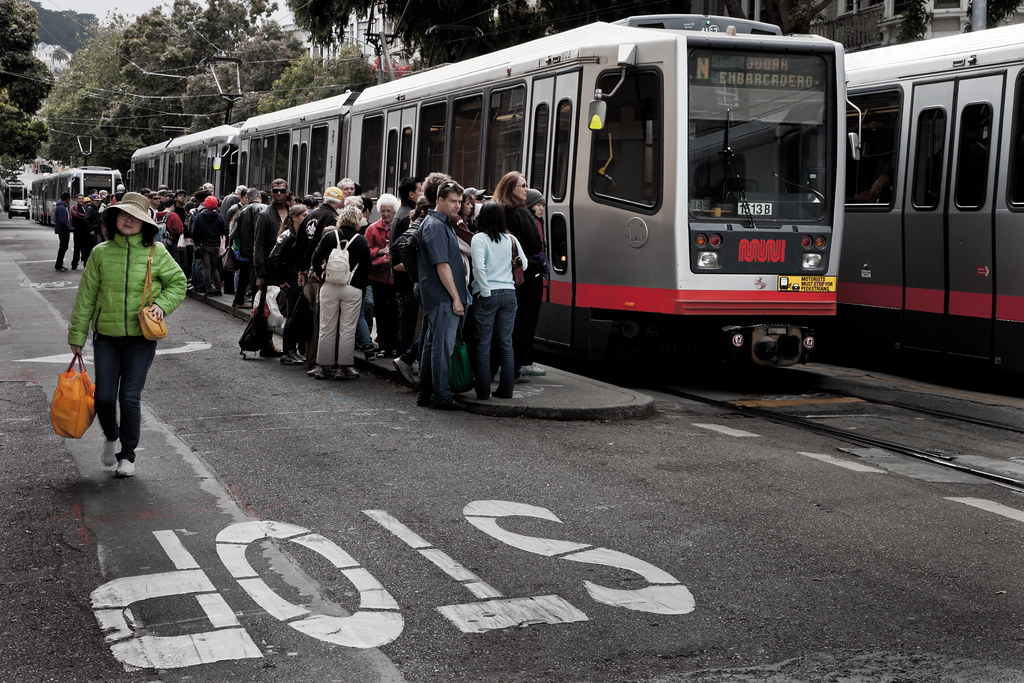Letting down their transit-riding constituents once again, the Board of Supervisors rejected a measure to increase Muni funding by ending a fee exemption for large non-profit developers, following an intense opposition campaign that sowed misconceptions about which organizations would have to pay the fee. The policy change, proposed as part of a regular update to the Transit Impact Development Fee, was opposed by all supervisors except Scott Wiener and Carmen Chu.
By ending the exemption from the TIDF currently enjoyed by large non-profit developments, including massive projects like hospitals and university campuses that generate thousands of daily trips, the proposal would raise more than $125 million in transit funding over the next 20 years. Now that funding is in doubt, and it's not at all clear that the Board of Supervisors will have the will to enact it when the proposal comes up again next year as part of the Transportation Sustainability Project, a broader effort by the city to reform the way it funds and plans transportation improvements.
"We can no longer continue on with the status quo of exempting these large institutions that put such a strain on the system," Joél Ramos, a member of the SF Municipal Transportation Agency Board of Directors, told the Board of Supervisors. "Without some way to have them pay their fair share, there's no way that we're going to be able to accommodate the growth in our city, and accommodate more folks on transit."
"We have $420 million in deferred vehicle maintenance," said Wiener, who championed the measure. "Muni riders see this every day: packed trains, broken doors, buses that don't arrive... this is Muni right now -- chronically under-funded, with decades of under-investments in maintenance and infrastructure, and we're paying the price in a very big way."
The proposal would have applied the one-time fee to the small subset of non-profits that propose real estate developments over 25,000 feet which increase a site's square footage. "To put that in context, the Office Max on Harrison Street is approximately 25,000 square feet," said Wiener.
Supervisors who voted against it said they would ultimately support ending the blanket exemption, but that it should be considered along with the entire TSP. The most vocal critic of Wiener's proposal was D7 Supervisor Sean Elsbernd, who said it would apply the fee to projects like gym expansions at private schools in his district, which he claimed don't necessarily generate new trips.
"You're right, Supervisor Wiener -- the hospitals should be paying this fee. They are trip generators," said Elsbernd. "But I don't think today is the day to start picking and choosing what non-profits should pay the fee, what non-profits shouldn't... That is something that should happen through your TSP discussion."
Wiener said that the fee changes were based on the city's recent Nexus Study, which analyzed the impacts that different types of development have on traffic. He noted that opponents refused to compromise or negotiate the terms of the changes, such as the square-footage threshold that would trigger the fee. "This blanket opposition, in my view, is unfortunate, and does a disservice to good transit policy," he said.
Opposition to the proposal came from an unusual alliance between non-profits and the Chamber of Commerce, spearheaded by the Hospital Council of Northern and Central California. Many organizations who signed on against the measure seemed to be misled by a list of talking points distributed by the Human Services network, an association of 110 non-profits, which claimed that the fee would be burdensome on non-profits but didn't clarify which ones would be required to pay it.
"I've got some allies on this that, never in my eight years, have they ever been allies," Elsbernd noted.
The effort to reform non-profit development exemptions is expected to return with the TSP, a larger systemic overhaul which could provide crucial stable funding for transit, walking and biking improvements in the long-term. Public discussions on the program are expected to begin in January, and sustainable transportation advocates are beginning to scrutinize the program to ensure that developers pay for the full traffic impacts of their projects.
To reach that goal, Livable City Executive Director Tom Radulovich said ending fee exemptions carved out for developments like major non-profit projects will be a step in the right direction, but that the TSP has more work to be done.
"The bigger concern we have with both the TIDF and the proposed TSP is that they use a flawed method for determining the impact of development on the transportation system, which makes the fee structure less fair and less effective," said Radulovich. "In the city's method, a new parking structure, or excess parking in a development, generates no additional auto trips, and thus pays no impact fee. This makes the both the TIDF and TSP unfair -- a nonprofit clinic, say, would pay an impact fee, but a for-profit parking structure would pay no fee -- and ineffective as a mitigation for the true impacts of development on the transportation system, since projects with huge transportation impacts can pay little or no fee."
"The city's strategy to base both its environmental review and development impact fees on automobile trips generated depends on being able to forecast automobile trips generated with reasonable accuracy, which they can't do with their current model," he said.
With broader reforms sought in the TSP, the political battle over non-profit exemptions figures to be one of many fought at City Hall next year. Wiener said elected officials will have to stand by their rhetorical commitments to prioritizing funding for transit, which is not the norm. "We are supposedly a transit-first city, where we want people out of their cars," he said. But "when it comes to any funding fights, Muni loses."
Read more from the Board of Supervisors hearing at the SF Examiner and the Bay Guardian.





